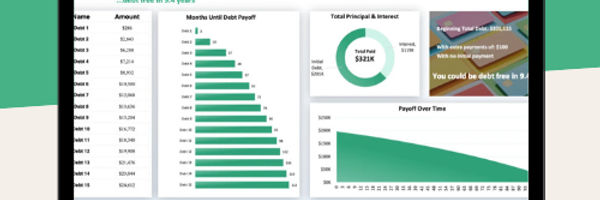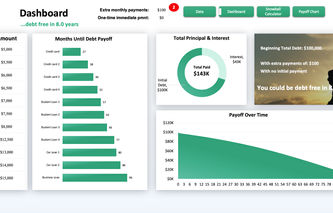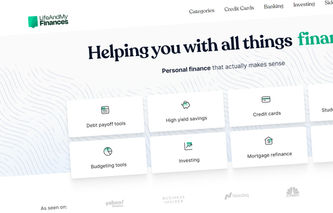Picture this—you’ve just kick-started your business, and you’re nervous as a cat. But just then, you get offered a helping hand—one that simplifies expenses, earns rewards, makes corporate purchases easier, helps build business credit, provides great rates on loans, and even makes tax filing bearable.
This helping hand is no fairy godmother. It’s a simple business credit card.
That’s probably why you’re looking for ways to get your hands on one.
Good news—your search stops here.
This article will tell you:
The four simple steps involved in getting a business credit card.
A breakdown of the basics of how business credit cards work.
Answers to key FAQs on how to get a business credit card.
How to Get a Business Credit Card in 4 Simple Steps
A business credit card is like any other credit card—except it’s specifically for business use. It comes with some great perks, like a higher credit limit and itemized year-end statements that make tax return filing easy.
And the best part is, you don’t need a formal business structure(like an LLC or S Corp.)to get a business credit card. Freelancers, sole proprietors, gig workers, and independent contractors can all qualify for a dedicated business card.
In fact, American small businesses are some of the biggest consumers of business credit cards (the Federal Reserve Bank’s Small Business Credit Survey says 67% of small businesses use them—while a recent study by the Mercator Advisory Group indicates that small businesses spend 1 in every 6 dollars spent on credit cards).
Similar articles:
How Many Credit Cards Should I Have? The Good and the Bad of Owning Multiple Cards
What Is a Good APR for a Credit Card (What Annual Percentage Rates are Low, Average, and High)
Here’s a breakdown of how you can get one in four simple steps:
1. Check your credit score, credit report, and eligibility
Whether you qualify for a business credit card largely depends on your personal credit score. So, even if your company is two days old, it has the same shot as more established companies. You’ll typically need a good to excellent credit score to qualify for most business credit cards (that’s usually a personal FICO score of 690 or higher)—but there are also secured credit card options for entrepreneurs with bad or fair credit.
With My FICO, you can compare your FICO Scores and credit reports from all three major credit bureaus—Experian, TransUnion, and Equifax.
The next step is to make sure you check for any errors on your credit report. If there are any, it’s crucial to get them corrected before you try to apply for a credit card.
Why does your business credit card approval depend on your personal credit score?
Because you don’t need an employer identification number (EIN) to apply for a business credit card—so for businesses without an established business credit history, the owner’s Social Security number (SSN) and personal credit history will prove the business’s creditworthiness.
This can be great for new and small businesses—but it also means that you (the owner) are personally responsible for paying back the credit card debt. Miss a payment or make a late one, and your personal credit score will suffer.
Keep in mind that one way to protect your personal assets is incorporating your business as an LLC (limited liability company). Getting a business credit card for LLC ensures your company is a separate entity from your personal assets, and gives you the ability to apply for business credit under your company name instead of your personal name.
2. Research and compare different business credit cards
Once you know what credit cards you can qualify for, narrow down your options based on specific needs—you’ll want to compare key credit card features, rewards, rates, and fees.
Here’s a table with the aspects you should compare:
FEATURES / FEES | WHAT TO CONSIDER |
Credit card issuer | Stick to reputed and major banks—such as Bank of America, JPMorgan Chase, Wells Fargo, US Bank, Citigroup, and so on—but first try to leverage the relationship you already have with your bank. |
Type of business credit card | Different types of business credit cards cater to specific needs—these include 0% APR cards, cash-back business cards, travel credit cards, and lower interest rate credit cards. |
Annual fee | What the card issuer charges you for the card’s rewards and benefits—this is why cards with better rewards tend to have higher annual fees. |
Interest rates | A yearly rate you pay for borrowing money from your card issuer—you can usually avoid paying it if you don’t carry a balance from month to month. |
0% Intro APR Period | Some business credit cards come with a 0% intro APR offer (they charge a 0% interest rate on existing or new debt)—this can benefit startups that need to finance business purchases without accruing interest. |
Balance transfer fee | Most credit cards (even the ones with a 0% intro APR offer) have a balance transfer fee (usually 3%–5%). |
Rewards program | Usually, business credit cards offer two types of rewards— Flat-rate rewards give you the same amount of points regardless of what category you spend in. Tiered rewards offer higher rewards for spending more (or in a certain category). |
Foreign transaction fee | Credit cards can charge a standard 3% foreign transaction fee when you make purchases outside the US, or if you buy a product online from a foreign retailer—so if you often travel abroad on business, go for a credit card with lower (or zero) foreign transaction fee. |
Welcome Bonus | A welcome bonus typically includes extra points, rewards, miles, or cash back if you spend a certain amount of money within the first few months of using your card. |
3. Apply for the most suitable business credit card
Once you’ve decided on a business credit card, you should be able to apply for it instantly—given that you have the necessary information at hand.
You’ll have to provide a mix of personal and business information to apply. Almost all business credit cards will ask for your Social Security Number—but there are a handful that let you apply with just your Employer Identification Number (EIN).
Here’s some of the key information you’ll need for your application:
Your business’s legal name, address, and phone number
Type of business and industry details
Legal structure of your business
Federal tax identification number (Your EIN and/or SSN)
Number of employees working for your business
Approximate annual business revenue
Estimated monthly expenses on the credit card
4. Wait for the approval decision
Here’s an encouraging statistic: 80% of businesses that apply for credit cards were approved (says Small Business Credit Survey).
It usually shouldn’t take too long to hear back about approval after submitting your credit card application—most online applications will tell you almost instantly if you qualify.
Once you’re approved, you’ll be notified about when to expect your business credit card in the mail—and you’ll most likely get an email on creating an online account. Check the accompanying information, and then activate your business credit card.
However, if you get denied, make sure you check the issuer’s reason for denial—this will help you figure out if something is affecting your credit score.
Read more:
Understanding the Basics of Business Credit Cards
Now you know the steps to getting a business card—so let’s take a step back and go through the basics.
1. How do business credit cards work?
Pretty much the same way as personal credit cards—but they tend to have a higher spending limit and better rewards programs. They also include business-centric tools to help track expenses in various categories. You can usually download this expense information, and easily import it into your business accounting software.
2. What are the different types of business credit cards?
There are three main types of business credit cards—
A. 0% APR cards
They have a 0% introductory APR on new purchases and balance transfers for a limited time—when you won’t have to pay your credit card’s ongoing interest rate (typically 15–18 months, for some cards even 21 months).
These cards are especially useful if you’re looking to finance large purchases or consolidate existing debt for your business—but keep in mind that even credit cards with a 0% intro APR offer have a balance transfer fee (usually 3%–5%).
B. Cash-back cards
These business credit cards earn cash back, and are very versatile in nature. You can choose to redeem your rewards as a statement credit or get them deposited into a connected bank account.
Some cash-back cards will give you the same amount of points regardless of what category you spend in—this is called a flat-rate program. Other cash-back cards have tiered rewards—they usually offer a higher rate of interest if you spend more on specific categories (like groceries, gas, department stores, or even Amazon purchases).
C. Travel credit cards
Credit cards for business travel are perfect for people who spend a lot of time on the road (or in the air).Business travelcards earn points on travel-related expenses and offer additional traveller-friendly perks like lounge access and airline credits.
Just like cash-back cards, they offer either flat-rate rewards or tiered rewards—with certain categories earning a higher rate.
3. What are the benefits of using business credit cards?
Brian Greenberg, CEO and Founder at Insurist, believes that having a business credit card can be a real game changer for businesses:
“When you have a business credit card, you’re able to build your credit history as an entrepreneur or small business owner. This is especially important if you’re just starting out, because it will help you get better rates on things like loans and personal lines of credit. If you’re looking to expand your company in the future (like buying property), this can make all the difference when it’s time for financing.”
Apart from better access to funds and better rates on loans, here are some additional benefits of business credit cards:
A. Separate business finances from personal finances
A business credit card reduces your personal responsibility for business expenses—you build credit for your business, keeping your business and personal finances separate—so even if something terrible happens to your personal credit, your business can still be in a good position to ask for financing.
B. Track expenses
A business credit card payoff statement can make tracking expenses so much easier—and help you claim tax deductions for business costs.
C. Set up your own spending limits
Setting spending limits has many uses in a business environment. As a business owner, you can get employee cards—authorized-user accounts tied to the same credit line as the primary cardholder.
This way, you can track the exact amount of money your employees spend by using the credit cards your company gives them—which can give you key insights into where your funds are going and what they’re used for.
D. Comes with higher credit limits
Business credit cards have higher limits than personal credit cards—$30,000–$50,000 (or more)—giving you more room to cover common business costs.. And the extra grace period means 30, 60, or 90 days to pay back the money without interest—so you have more leeway to put money into your business
4. What are the limitations of a business credit card?
Business credit cards come with some limitations—
A. Expensive annual fees
Some business cards have no annual fees, but most are expensive and charge hundreds of dollars a year. This is often balanced out by high rewards and benefits (as well as higher credit limits).
B. High APR
Like most personal-use credit cards, business cards have a high APR. Your best bet is to use a business credit card with a 0% introductory APR—and pay off your balance before the regular APR takes effect.
C. Personal credit check and guarantee
Usually, there’s a personal credit check for the business owner or the authorized representative for all business credit cards—that’s because the person who applies for the card is technically held liable for any balance on the card that the business can’t repay.
Need help paying off the balance? Use our template 👇

Lay out your credit card debt with the minimum payments and interest to see how long it will take to pay off!
What you will get:
Interactive dashboard
Customizable to your needs
Stay on track with charts and graphs
Suitable for up to 16 or 32 debts!

Key FAQs on How to Get a Corporate Credit Card
Let’s understand all there is to know about business credit cards through some key FAQs.
1. How to get approved for a business credit card?
2. How to get a business credit card for a startup?
3. How to get a business credit card with bad credit?
4. How to get a business credit card without a business?
5. How to get a business credit card with just your EIN?
Top Credit Cards for Business You Should Consider
CRITERIA | BUSINESS PLATINUM CARD® FROM AMERICAN EXPRESS | CAPITAL ONE SPARK 2% CASH PLUS | U.S. BANK BUSINESS PLATINUM CARD |
Best for | Work travel | Cash back | 0% introductory APR; no annual fee business credit card |
Annual fees | $695 | $150 | $0 |
Credit score required | 690-850 (Good –Excellent) | 800–850 (Excellent) | 800–850 (Excellent) |
Variable APR | 19.24%–27.24% | No APR—pay off the balance in full every month to avoid a 2.99% late fee. | 16.99%–25.99% |
Perks | Tiered rewards system; Amex global lounge access; no foreign transaction fee; cash flow flexibility, etc. | Unlimited 2% cash back on every purchase; $1,000 in the first 6 months; no preset funding limit. | 0% Intro APR on purchases and balance transfers for the first 18 billing cycles. |
Rating | 4.5/5 | 4.5/5 | 4/5 |
Application link | card_name |
All information about the Business Platinum Card® from American Express has been collected independently by Life And My Finances.
Key Takeaways
A business credit card is created specially for business use—it helps track business expenses, and comes with higher credit limits.
Most top business credit cards require a personal FICO score of 690 or higher—but there are secured business credit cards for entrepreneurs with bad credit.
You’ll most likely need to provide your SSN to get access to a business credit card, especially if you’re a new business owner.
If you’re looking to expand your company in the future, getting a business credit card now can greatly change your funding prospects.
SOURCES
SMALL BUSINESS CREDIT SURVEY. (2016). https://www.newyorkfed.org/medialibrary/media/smallbusiness/2016/SBCS-Report-EmployerFirms-2016.pdf
U.S. Small Business Credit Card Forecast, 2017–2022: Healthy Market, Room for Improvement. (n.d.). Javelin. Retrieved March 17, 2023, from https://javelinstrategy.com/research/us-small-business-credit-card-forecast-2017-2022-healthy-market-room-improvement

.jpg)



